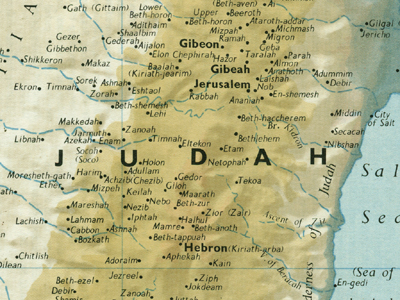
| The
Book Of Ruth |
Chapter
1: 1-5
"Ruth's Relationships"
J. Deering, AncientPath.net
| RUTH 1:1-5 | ||||
| 1. Master Study | 2. Visualized Text | 3. Outline With Text | 4. Reference Materials | 5. Questions |
MASTER STUDY
Introduction, Visualized Text with
Commentary and Q&A, Charts
INTRODUCTORY
COMMENTS:
If you have already read the
Chapter One Introduction you have seen the individual trees in the forest, let us now turn our
attention to a bigger frame of reference, and we have seen, in the Introduction
of Chapter one, this story has to do with the provision of God to work through
human circumstances to bring about His will. Through this story God is telling
us of the great depth of His wondrous grace.
The stage is set. The time is described as “In the days when the judges governed.” These were not days that included the deep fellowship of God and His people the Israelites. These were days when Israel had spiritually left the God of Israel. Joshua has died and with him died the days of a leader fully dedicated to doing the will of God. God gave Israel the “promised land” under the leadership of Joshua. God renewed His covenant under Joshua. It was Joshua who said, “As for me and my house, we will serve the Lord.” It was Joshua who on his deathbed called upon Israel to reaffirm her vows before the Lord and her willingness to serve Him and Him alone.
And it was Joshua who proclaimed of Israel, at the end of his life, “Ye cannot serve the Lord.” He knew and understood that such a wicked and stiff necked people would not and could not walk with God.
How long did their vows and dedication to God last?
“And Joshua, the son
of Nun, the servant of the LORD, died, being an hundred and ten years old. And
they buried him in the border of his inheritance in Timnathheres, in the mount
of Ephraim, on the north side of the hill Gaash. And also all that generation
was gathered unto their fathers: and there arose another generation after them,
which knew not the LORD, nor yet the works which he had done for
Israel.
And the children of Israel did evil in the sight of the LORD, and served Baalim
(pl): and they forsook the LORD God of their fathers, which brought them out
of the land of Egypt, and followed other gods, of the gods of the people that
were round about them, and bowed themselves unto them, and provoked the LORD
to anger. And they forsook the LORD, and served Baal and Ashtaroth. And the
anger of the LORD was hot against Israel, and he delivered them into the hands
of spoilers that spoiled them, and he sold them into the hands of their enemies
round about, so that they could not any longer stand before their enemies.”
Then came the Canaanites, the Moabites, the Midianites, and the Philistines, and 13 Judges to rescue the Nation.
It is before this backdrop that the story of Ruth is told. The best scholarship says that it takes place during the time of the Judge Gideon, when Israel is under the attack from the Midianites.
The story of Ruth, one cursed by the law becomes married to Boaz, and becomes the great-grandmother of King David, and in the lineage of Jesus, The Christ.
The story told in Ruth is three-fold.
First there is the story of the characters of the book and the events of their lives.
Second there is a bigger story that is symbolized by these characters of how God works and moves among His People, the Nation of Israel.
Lastly, there is the third foreshadowing and that is God’s precious relationship to His Church, The Body of Christ. God does not change, His grace is always the same and it is based on the individual’s willingness to believe and trust in Him without coercion on His part.
THE VISUALIZED TEXT (NASB) (conjunctions & prepositions (and other important words) underlined, words not in original text in italics) (alternate text in purple)
(1:1a)
Now
it came about
in the days when the judges governed (or, judged),
that there was a famine in the land.
(1:1b)
And
a certain man of Bethlehem in Judah
went
to sojourn in the land of Moab
with his (Lit., he, and ...)
wife and his two sons.
(1:2)
And
the name of the man was Elimelech (Name:
"my God is King"),
and
the name of his wife, Naomi (Name:
"pleasant, lovely");
and
the names of his two sons were Mahlon (Name: "puny") and Chilion (Name: "pining"),
Ephrathites (a designation for inhabitants of Bethlehem) of Bethlehem in Judah.
Now
They entered the land of Moab and
remained there.
Brief Commentary on Ruth 1:1-2
In verses 1-2 we learn that God is in the middle of chastising Israel through a great famine brought that is probably the result of years of war with the Midianites. Elimelech, Naomi, their sons, and their daughters become characters that play the part of the Nation of Israel in this saga. Elimelech, Naomi, and their sons have gone astray; probably somewhat involved in the idolatry that was sweeping Israel. When God brings His chastising hand against them – they flee. Yes they flee to a land that has food to spare, but they also are fleeing to a land, ruled by their cousins, in Moab; The Moabites, and it is a hotbed of pagan idol worship. Picture here the Nation of Israel making their decisions based on food, water, and political advantage, anything but faithfulness to her God.
Questions and Answers about Ruth 1:1-2
1. What are
Judges (in the context of The Book of Judges in the Bible)?
(Dictators (Scofield) who were raised up in the land
of Israel)
2. How many Judges were there?
(13 Judges in all, 7 failures, punishments and deliverances)
3. Why were there Judges in Israel?
(God provided during a time of needed deliverance of
the chastisements of the nation of Israel because of her sin (everyone did
what was right in his own eyes))
4. When was this?
(1400-1100 BC (the exodus to King Saul) - the conquest
of the Land through Judgeship of Samuel and the introduction to the monarchy)
5. What was the problem with Israel during "these days?"
(Idolatry) (mostly self)
6. What was the spiritual condition of Israel then?
(everyone did what was right in their own heart)
7. What is
a famine?
(a famine is a widespread shortage of food)
8 . What can be the cause of famine?
(Disease, infestation, pestilence, drought, flood, extreme
temperature, war) (Scholars believe that this particular famine was the result
of several years of devastation brought about by the Midianites [Judges 6:3-4].
They devastated the land and the soil during their oppression of Israel. It
was by the Midianites that Joseph was rescued from the pit, and sold to the
Ishmaelite, and eventually to Egypt [Gen. 37:28]. It was the Midianites who
for hundreds of years have occupied Moab. It is the Midianites who God is
using to chastise the nation of Israel.)
9 . What are the effects of a famine?
(regional malnutrition, starvation, epidemic, and increased
mortality)
10. Where was
Elimelech from (what town)?
(Bethlehem – Bethlehem Judah – Heb: Beyth_lechem,
the House of Bread [so designated because there were two Bethlehems in Israel])
11. Where was Elimelech from (what tribe)?
(Judah)
12. Find Bethlehem on a Bible map.

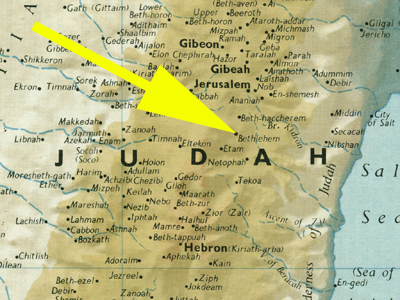
13. Where
did Elimelech go?
(he sojourned (a brief period of residence) in the Land
of Moab)
14. Find the country of Moab on a Bible map.
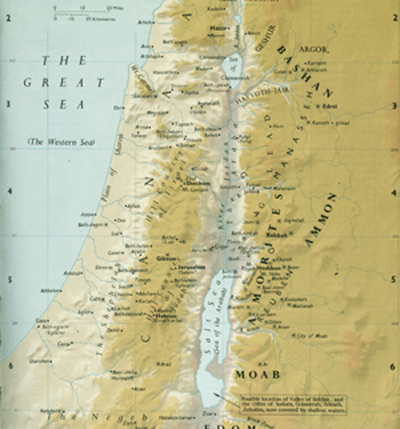
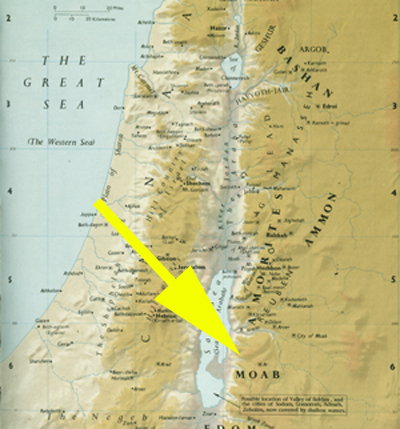
15. Who were
the Moabites (what family did they come from)?
(the family of Lot’s daughter – Abraham’s
cousin’s daughter)
16. Who did
Elimelech bring with him to Moab?
(a wife and 2 sons)
(Matthew Henry: Elimelech's care to provide for his
family was not to be blamed; but his removal into the country of Moab could
not be justified. And the removal ended in the wasting of his family. It is
folly to think of escaping that cross, which, being laid in our way, we ought
to take up. Changing our place seldom is mending it. Those who bring young
people into bad acquaintance, and take them out of the way of public ordinances,
thought they may think them well-principled, and armed against temptation,
know not what will be the end. It does not appear that the women the sons
of Elimelech married were proselytes to the Jewish religion. Earthly trials
or enjoyments are of short continuance. Death continually removes those of
every age and situation, and mars all our outward comforts: we cannot too
strongly prefer those advantages which shall last for ever.) Matthew Henry
17. What does
the name Elimelech mean?
(My God Is King)
18. What was
his wife's name?
(Naomi)
19. What does
the name Naomi mean?
(Pleasant, Lovely)
20. What were
his son's names?
(Mahlon and Chilion)
21. What does
the name Mahlon mean?
(Puny, however their names - both Mahlon and Chilion
- were not Hebrew names but transliterated from the Moabite language and their
real meanings lost)
22. What does
the name Chilion mean?
(Pining, however their names - both Mahlon and Chilion
- were not Hebrew names but transliterated from the Moabite language and their
real meanings lost)
23. What can
you say about names in Bible times?
(When People were named sometime before birth, they
were usually named for an event that happened to one or both of the parents,
and people named sometime after birth, usually representative of some early
character trait)
24. What is
an Ephratite?
(1. Someone from the Tribe of Ephraim)
(2. Someone from the geographical area of Mount Ephraim:
the historical name for the central mountainous district of Israel once occupied
by the tribe of Ephraim (Josh. 17:15; 19:50; 20:7), extending from Bethel
to the plain of Jezreel. In Joshua's time (Josh. 17:18), approximately sometime
between the 18th century BCE and the 13th century BCE, these hills were densely
wooded. They were intersected by well-watered, fertile valleys, referred to
in Jer. 50:19.)
(Joshua was buried at Timnath-heres among the mountains of Ephraim, on the north side of the hill of Gaash (Judg. 2:9). This region is also called the "mountains of Israel" (Josh. 11:21) and the "mountains of Samaria" (Jer. 31:5, 6: Amos 3:9)). From the public domain Easton's Bible Dictionary, originally published in 1897.)
25. Why specifically
an Ephratite from Bethlehem?
(The birthplace of Jesus Christ, Bethlehem - Ephrathah,
meaning house of bread in Ephraim tribal lands, is one of the most famous
Bible Places of Bible History. So famous in fact that it has eclipsed another
town that existed in Israel by the same name. Bethlehem – Ephrata where
the Messiah was born is in the south, near Jerusalem, in the territory of
Judah. The other Bethlehem is in the north, near Nazareth, in the territory
of Zebulon)
26. What Biblical
characters and events concern Bethlehem.
1.(1 Sam 17:12 Now David was the son of that Ephrathite
of Bethlehem of Judea, whose name was Jesse)
2. (Micah 5:2 Prophetic verse about birthplace of Messiah)
3. (Benjamin was born there, and his mother Rachael died and was buried there)
4.( A Prophetic Utterance of Mary - Ruth 4 :11-22, “We are witnesses.
The Lord make the woman that is come into thine house like Rachel and like
Leah, which two did build the house of Israel: and do thou worthily in Ephrata,
and be famous in Bethlehem. And the women her neighbors gave it a name, saying,
There is a son born to Naomi; and they called his name Obed: he is the father
of Jesse, the father of David.”) (Abridged) (also see REFERENCES for
Ruth 1:2 below.)
27. Where was the land of Judah?

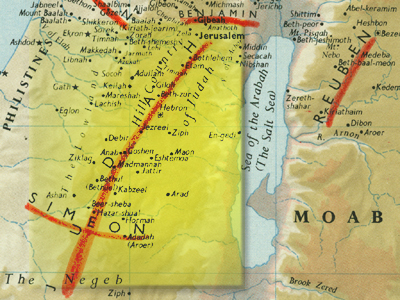
28. What Biblical characters and events concern Judah?
29. Spend some time considering the importance of Judah, Bethlehem, and Jerusalem.
30. What
does it mean that they "entered the land of Moab?"
(They went in – into – with a purpose, 1:1
indicates their intention was to “Sojourn” or stay briefly, however
the Heb: hayah used here means their intention changed along the way and they
intended to remain there permanently (Heb usage: as a beacon, not as a copula
[connective, temporary])
31. What
does it mean that they "remained" there?
(They became “naturalized” – they
make their home there)
(1:3)
Then
Elimelech,
Naomi's husband,
died;
and
she was left with her two sons.
Brief Commentary on Ruth 1:3
God moves against them for their stiff necks and their sin – Just has He does for the Nation of Israel. Consider this: God’s People Dying of Famine … In The Promised Land. Naomi looses her husband and then her two sons. She is left alone, even the inheritance that would have been hers from Elimelech – if she lived in this country – was lost, as inheritance was only allowed through the men. Thus everything she had was to be forfeit upon her return to her people of Israel.
And so the Nation as God moves to purify His people. Many lives are lost when God moves against sin and His inheritance remains intact to those who believe and are obedient in their faith.
Questions and Answers about Ruth 1:3
1. The word
"then" is often used as a transitional word. What has occurred here
that requires this word?
(Major plot shift)
2. Who died?
(Elimelech)
3. What is
his relationship to the story, so far?
(Naomi’s husband – head of household)
4. What is
the implication of a Jewish husband’s death on the family status?
(All that was his and Naomi’s was divided up to
the sons)
5. Where
would the inheritance continue with the death of the husband?
(Double portion to the oldest son [Mahlon] [2/3], and
he becomes head of household)
6. Who was
left with two sons?
(Naomi)
7. Who were
the two sons?
(Mahlon and Chilion)
(1:4a)
And
they took for themselves Moabite women as wives
the
name of the one was Orpah and
the name of the other Ruth.
Brief Commentary on Ruth 1:4a
While there they continue their waywardness from God by allowing their sons Mahlon and Chilion to take Moabite women as their wives. The Moabites were not among the list of nations forbidden for marriage to an Israelite, but they were on the list of those who would not be considered to become members of the Nation of Israel, even if proselytized, until after the tenth generation.
Questions and Answers about Ruth 1:4a
1. What did
the sons choose to do "for themselves?"
(Take wives)
(they took (KJV): The Targum says, "they transgressed
the decree of the word of the Lord, and took to them strange women."
– However they did not violate the Law by taking Moabitesses as wives,
but they could not become “Jews” according to the law (as could
a proselyte)
(Nations under the No Marry Law: the Hittites, and the Girgashites, and the Amorites, and the Canaanites, and the Perizzites, and the Hivites, and the Jebusites [Deuteronomy 7:1-3])
(Nations under the Not To Be Made Members Of The Congregation Of Israel Law: 3 An Ammonite or Moabite shall not enter into the congregation of the LORD; even to their tenth generation shall they not enter into the congregation of the LORD for ever: 4 Because they met you not with bread and with water in the way, when ye came forth out of Egypt; and because they hired against thee Balaam the son of Beor of Pethor of Mesopotamia, to curse thee. [Deuteronomy 23:3])
2. What is
the implication of the fact that the text says "for themselves?"
(Probable reference to the times [the times of the judges]
when everyone did what was right in their own eyes, they did not take Hebrew
women “To Please The Lord.”)
3. What is
the relationship to this action and "The Times of The Judges?"
(Fits right in!)
4. Did the
sons marry "in the faith?"
(No, they took Moabitesses as wives)
5. What faith
or religion did Moabites practice?
(Pagan Idol worship)
6. Do you think
the sons expected to return to Israel?
(Probably not – if they had children by their
wives the children would be Jews, but their wives would never be welcome [shunned]
if they returned to Israel)
7. How do you
think Naomi felt about their dating and marriage?
(Resigned to it – she was now their ward)
8. What were
the girl's names?
(Orpah and Ruth)
9. What does
the name Orpah mean?
(possibly neck or cloud, but Orpah is a transliteration
in Hebrew of the Moabite name)
10. What does
the name Ruth mean?
(possibly Friendship, but Ruth is a transliteration
in Hebrew of the Moabite name)
(1:4b)
And
they
lived there about ten years.
Brief Commentary on Ruth 1:4b
As is often the case the plans of mice and men often go astray. Elimelech’s family settles in to the land of Moab and no longer become sojourners. They have forsaken Judah and their God. While they are still members of the tribe of Judah they have left the fellowship of their God and are now living amongst the pagans and idolaters of the land of Moab. The famine in Judah, brought about as a chastisement from God for these very acts of the Nation goes on and on – for at least 10 years.
Questions and Answers about Ruth 1:4b
(1:4b)
And they lived there about ten years.
1. How long
did they live together in Moab?
(10 years after the son’s marriages – it
is unknown how long they lived there before the sons entered into marriage)
2. What is
Naomi’s place at this time in the story?
(The kept mother – 2/3 to Mahlon and his wife,
1/3 to Chilion and his wife)
(1:5)
Then
both (Lit., both of them) Mahlon and Chilion also died;
and
the woman was bereft of
her two children and
her husband.
Brief Commentary on Ruth 1:5
We begin this verse with the word “then.” The context indicates a word of “results.” The result of their waywardness (as also the waywardness of the nation of Judah) is the death of many of the rebellious.
Not only is Naomi’s husband dead but also the husbands of her daughter-in-laws (her sons).
Questions and Answers about Ruth 1:5
(1:5)
1. The word
"then" is often used as a transitional word. What has occurred here
that requires this word?
(Major plot shift)
2. Who dies?
(Mahlon and Chilion)
3. Did either
Mahlon or Chilion have any off-spring?
(No, especially not sons, after all it is the point
of the story)
4. What is
the implication of a Jewish husband’s death on the family status?
(Women did not inherit)
5. Where would
the inheritance continue with the death of the husbands?
(Oldest living male of whole family, whatever money
and property they had with them reverted to Mahlon and Chilion, plus monies
and properties back in Israel, upon their death, all that was theirs)
(Mahlon & Orpah, Chilion & Ruth, and Naomi was returned to the oldest living male of the whole family in Israel, leaving Naomi, Orpah, and Ruth with nothing, they were indigent, living in a foreign land that hated the Jew.)
6. Who does
it say that was "bereft?"
(Naomi)
7. Why is Naomi
the center of the story and not the two wives who just lost their husbands?
(That’s the way God wrote it! This keeps Naomi,
and eventually Ruth, at the center of the plot line.)
8. Can you
draw some parallels between the story of Naomi and the condition of the Nation
of Israel at that time?
(Out of fellowship, into the Lord’s discipline
[not about the deaths, but the condition], In a strange, hostile, foreign
land, without rights, without privilege.)
(They
are now utterly alone – how tragic.)
9. What can Naomi do to regain her husband’s property and land now
that there are no living male descendants and Elimelech's (Nahlon's and Chilion's)
property has effectively returned to his family?
(Return home and place her hope upon Levirate Marriage…(
Marriage of convenience to the husband’s close male relative who willingly
takes on the responsibilities of “husband” for the express purpose
of male children to carry on the family name, property and land.))
Horizontal Chart for Ruth 1:1-5
| Ruth 1:1-5 "Ruth's Relationships" |
|||||
|
Ruth 1:1a Statesmen "Now it came about in the days when the judges governed," |
Ruth 1:1b-2 Sojourn to Moab "Now it came about in the days when the judges governed, that there was a famine in the land. And a certain man of Bethlehem in Judah went to sojourn in the land of Moab with his wife and his two sons. And the name of the man was Elimelech, and the name of his wife, Naomi; and the names of his two sons were Mahlon and Chilion, Ephrathites of Bethlehem in Judah. Now they entered the land of Moab and remained there." |
Ruth 1:3 Sorrow In Moab "Then Elimelech, Naomi's husband, died; and she was left with her two sons." |
Ruth 1:4a Sisters-In-Law "And they took for themselves Moabite women as wives; the name of the one was Orpah and the name of the other Ruth." |
Ruth 1:4b Stay In Moab "And they lived there about ten years." |
Ruth 1:5 Sustained Sorrow in Moab. Then both Mahlon and Chilion also died; and the woman was bereft of her two children and her husband. |
Verse Percentage Chart for Ruth 1:1-5
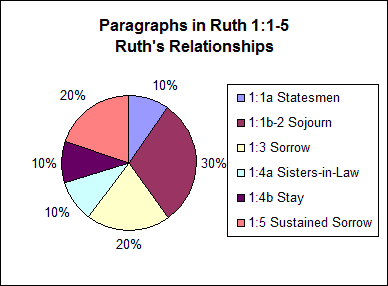
| RUTH 1:1-5 | ||||
| 1. Master Study | 2. Visualized Text | 3. Outline With Text | 4. Reference Materials | 5. Questions |
The Book of Ruth, Bible Study, J. Deering, AncientPath.net, study materials are a ministry of AncientPath.net, and may be copied for use in Bible study groups, in limited numbers, providing that no charge is made for them. No further distribution or use of these materials is allowable under U.S. or International Copyright Law without the express permission of AncientPath.net. ©2008 AncientPath.net, All rights reserved.
2012-11-20